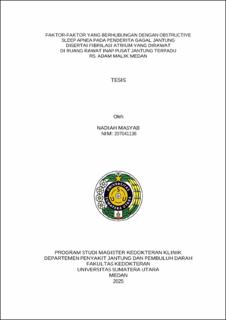Faktor-Faktor yang Berhubungan dengan Obstructive Sleep Apnea pada Penderita Gagal Jantung Disertai Fibrilasi Atrium Yang dirawat Di Ruang Rawat Inap Pusat Jantung Terpadu RS. Adam Malik Medan
Factors Associated with Obstructive Sleep Apnea in Heart Failure Patients with Atrial Fibrillation Admitted to the Cardiac Center at RS Adam Malik, Medan

Date
2025Author
Masyab, Nadiah
Advisor(s)
Lubis, Anggia Chairuddin
Raynaldo, Abdul Halim
Metadata
Show full item recordAbstract
Background: Obstructive sleep apnea (OSA) causes cardiovascular diseases due
to intermittent hypoxia, oxidative stress, systemic inflammation, excessive
negative intrathoracic pressure, heightened sympathetic activation, and increased
blood pressure. These factors can impair myocardial contractility and contribute to
the development of heart failure and atrial fibrillation. Epidemiological studies
have shown a significant independent association between OSA and both heart
failure and atrial fibrillation.
Objective: This study aims to identify the factors associated with obstructive
sleep apnea (OSA) in patients with heart failure accompanied by atrial fibrillation.
Methods: This study was conducted on patients diagnosed with heart failure and
atrial fibrillation who were hospitalized in the Integrated Cardiac Care Unit of
Adam Malik General Hospital. Data collection began in August 2023 until
November 2024. This research is an analytical observational study with a cross
sectional design.
Results: A total of 51 patients were involved in the study. The majority of
respondents were male (34 individuals, 66.7%) and predominantly aged between
60–69 years. The study showed that among patients with heart failure and atrial
fibrillation, the most common degree of OSA was mild (16 individuals, 30.8%),
followed by moderate (13 individuals, 25.0%), and severe (9 individuals, 17.3%),
with an average AHI of 16.78 and a standard deviation of 14.359. Multivariate
analysis revealed two significant variables: smoking history and functional
capacity (NYHA Class) (p > 0.05).
Conclusion: There is a significant relationship between gender and smoking
history with the incidence of OSA in patients with heart failure accompanied by
atrial fibrillation. In multivariate analysis, smoking history and functional capacity
(NYHA Class) were identified as significant variables (p < 0.05).
